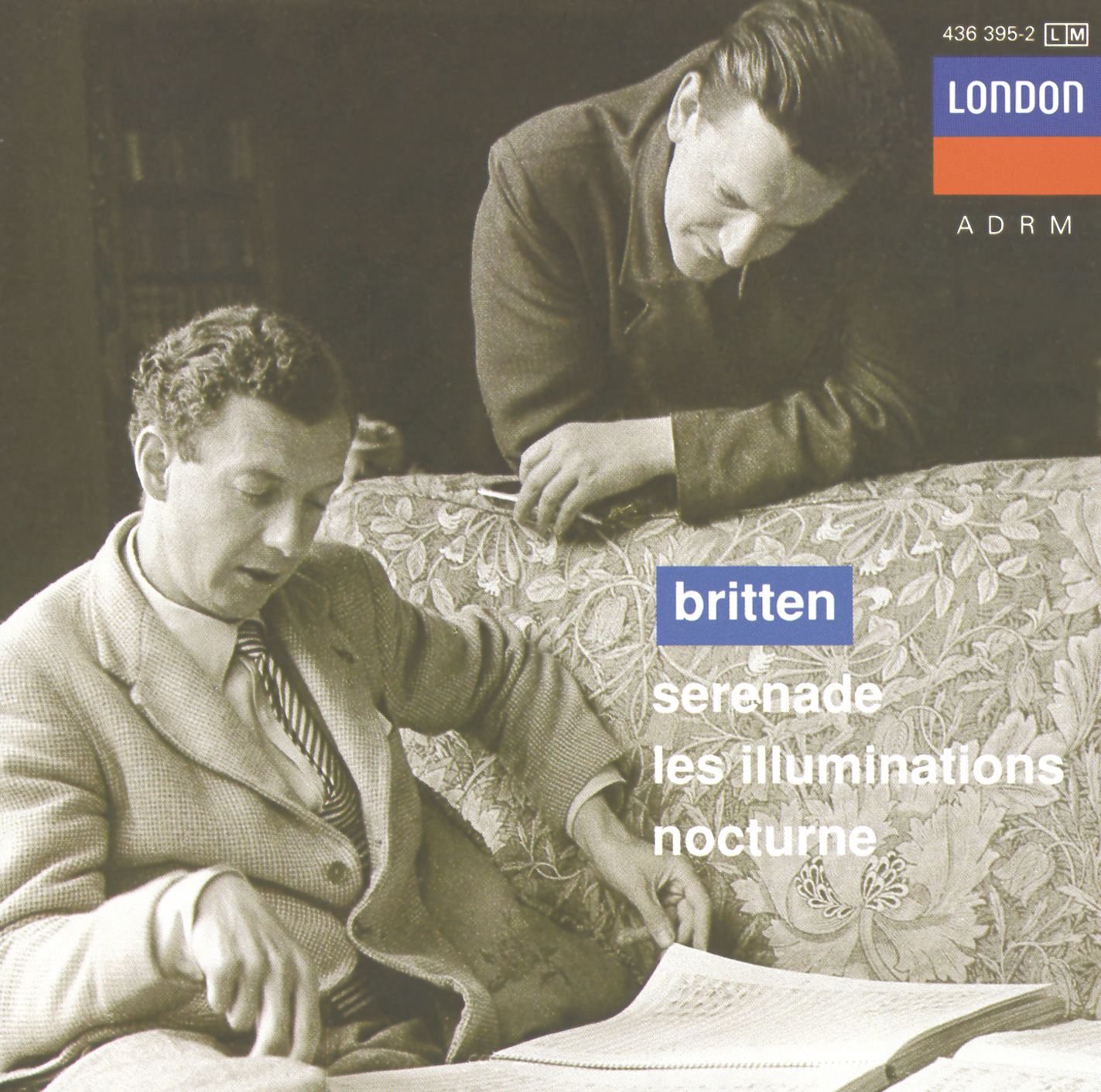In classic performances from tenor Peter Pears and Benjamin Britten himself.Of course, Pears performed these decades earlier in mono, I think in the 40s, but these stereo ones from the 60s are easier on my ears.
The stereo sound benefits Barry Tuckwell most in the Serenade, for we can hear his throw-caution-to-the-wind approach on the horn. When adding more instruments to the Nocturne and Illuminations, the improvement in sonics multiplies in comparison.
Well, if wanting to get to know these songs, where better than to start than with Pears singing and Britten at the podium.
A review from 2019
Benjamin
Britten’s three orchestrated song cycles, while modern of sound as
Britten was apt to be, are far from unapproachable. Each song cycle,
Serenade, Nocturne, and Les Illumination exhibit remarkable diversity
from movement to movement and song to song, the music never seems to be
doing the same thing for very long, one of the reasons I think these
works never outstay their welcome and remain a refreshing listening
program. And despite some of the heavy-hitting poetry that is set to
music here, Britten is never afraid to lighten the mood or inject humour
when needed. Britten’s settings of text to voice does not have a
Baroque quality, there aren’t any long, protracted melismatic settings
of words, nor are there oft-returning important words or phrases that
Britten highlights in the music, instead staying true to the written
poetry in what is essentially straight-forward, syllabic presentations
of the texts, but set in Britten’s unique musical world.
One of
the inescapable truths of this recording is that Britten himself is at
the podium here, and as it is with Leonard Bernstein’s recordings of his
own compositions, you get a sense here that this is exactly how the
orchestral voices are supposed to sound. Britten is unusually
characterful with his orchestral leading, outdoing his 40’s premier
recording now on Eloquence,
successfully contrasting the stark, haunting, lean string settings,
with the more robust, perky, colourful sounds, against the dramatic,
sometimes heroic musical settings. It also helps that this 1960’s Decca
recording, duly remastered, sounds so good; there is dimensionality to
the performers, including the London Symphony and English Chamber
Orchestras, the headliner soloists, and the obbligato instruments of the
nocturne, all of which are quite present. There is no congestion in the
sound in the least, a firm bass line, and an overall clear presentation
that exceeds my expectations.
Of course, a song cycle is only as
good as its solo performers, and here we get Britten collaborator Peter
Pears, at the time of this recording, a tenor in his 50’s. Even as a
younger performer, many have taken issue with Pears’ singular vocal
quality, a tangy, fluting sound that Britten preferred in all of his
tenor composing, so in the least, this recording shows Britten’s
compositional intent, although I have never found Pears terribly
off-putting. Even in his later career, though, Pears is unequalled in
his ability to communicate, especially Britten’s unique settings of
texts, without being fussy. Pears’ sound can be at once heroic and the
next lithe, and while his technique is consistent across his range, you
won’t get a wide range of contrasting colours or shading from his sound,
Pears seems to contrast mostly through effort and textual inflection.
In addition, Peter Pear’s French in Les Illumination might not be
authoritatively Gallic, but it is effortlessly characterful and
expressive along with the other works on this disc. Other reviewers here
have extolled the throw-caution-to-the-wind horn playing of Barry
Tuckwell as the true successor of the original hornist Dennis Brain, and
Tuckwell, along with the parade of Nocturne soloists, are caught quite
well on record.
As far as recorded competitors, most tenors have
lain too close to Pears’ performance to justify buying another
recording, especially with the authority of having Britten at the helm
in good sound. And despite fine singing by Bostridge on Warner and EMI, Rolfe-Johnson on Chandos, and Padmore on Harmonic Mundi
(among others), who may have more appealing tenor timbres to some
listeners, the orchestral leading on those recordings can be too heedful
or the horn too mindful in comparison to what is presented here by
Decca. I do like Jerry Hadley’s presentation of these works on Nimbus
for his opposite approach to these works, truly setting himself apart
from Pears and Britten with a muscular, raucous interpretation as a
recorded companion to Pears’ flowery musical weavings, although Hadley
lacks English credentials outside of Boughton and the English Chamber
Orchestra.
Irregardless, Decca’s excellent recorded sound,
Britten’s authoritative and characterful orchestral leading, and Peter
Pears’ effervescent musical stylings make this recording an easy first
choice, even over their original recording from the 40’s, especially for
Barry Tuckwell’s abandon on horn.
Works
Serenade, op. 31 (24.05)
Les Illuminations, op. 18 (22.07)
Nocturne, op. 60 (16.59)
Soloists
Peter Pears, tenor
Barry Tuckwell, horn
Osian Ellis, harp
Performers
English Chamber Orchestra
London Symphony Orchestra
Benjamin Britten, conductor
Label: Decca
Year: 1960-67; 1993
Total Timing: 72.47
A classic account of Britten's orchestrated song cycles, hardly bettered elsewhere.
Some take issues with Peter Pears singular singing tone, but it is heard as Britten intended, although the tenor is a bit older than his earlier performance.
Of course, for a wholly different approach, I would recommend Jerry Hadley.


Comments
Post a Comment